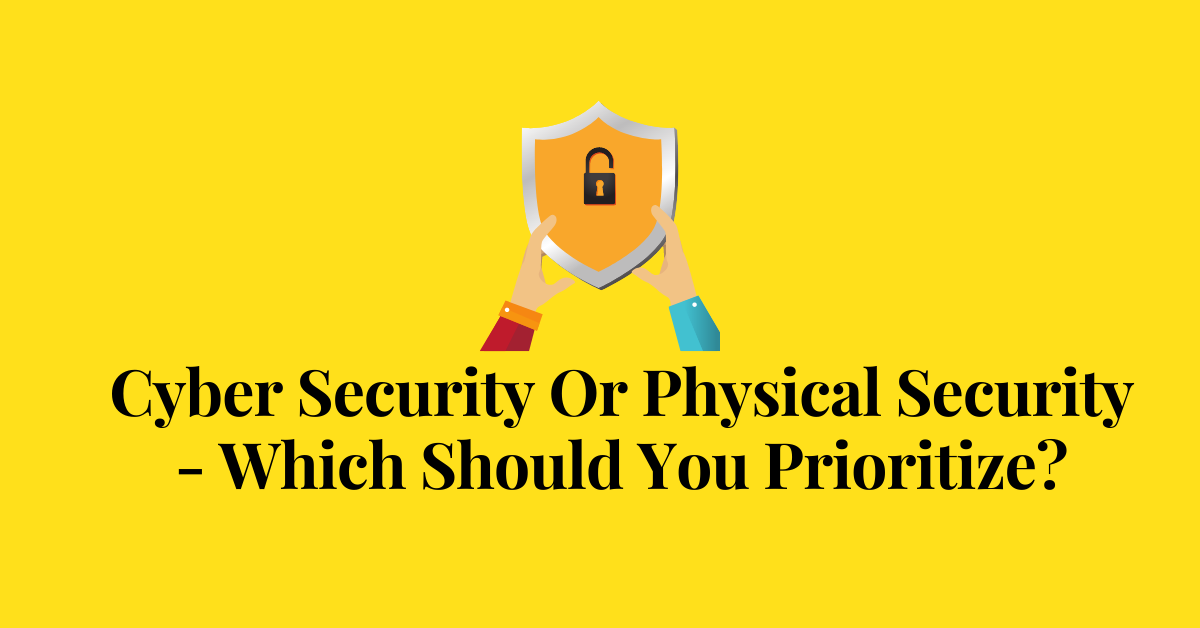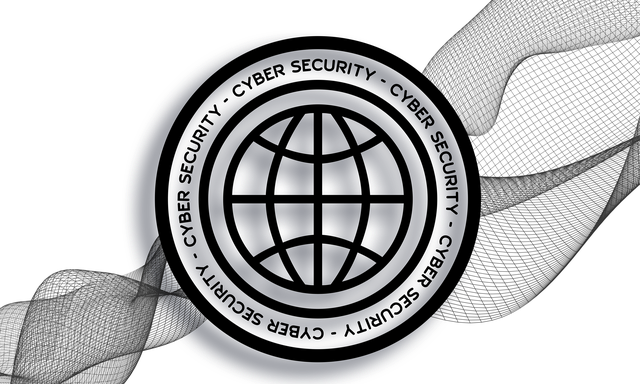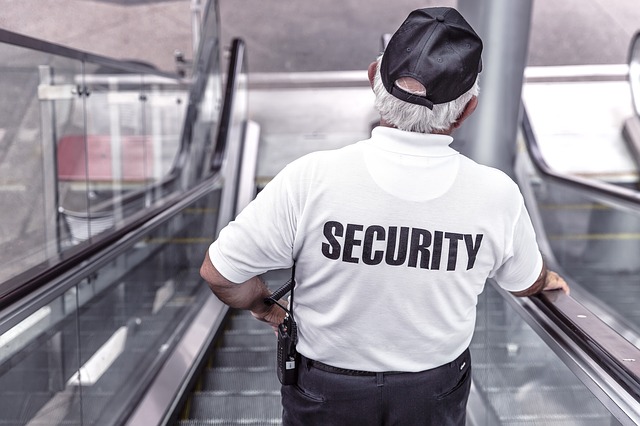This post will show you whether to prioritize cyber security or physical security.
Companies need to cover all security aspects when looking to protect their business – including cyber and physical security.
Typically, businesses have a physical security team comprising security guards and CCTV, as well as a separate IT team focused on the brand’s cybersecurity. The resources needed for both aspects are very different, and many companies prioritize one over the other.
However, businesses face physical and cyber threats nowadays, so it is vital to invest equally in them. While this will come with a significant cost, it may save your business thousands in the long run, as you will not have to pay for repairs or IT breaches.
Table of Contents
Cyber Security vs. Physical Security
Here’s a table outlining the key differences between Cyber Security and Physical Security:
| Feature | Cyber Security | Physical Security |
|---|---|---|
| Focus | Protecting information systems, data, and networks from unauthorized access, use, disclosure, disruption, modification, or destruction | Protecting physical assets, personnel, and resources from theft, damage, unauthorized access, or disruption |
| Threats | Hackers, malware, phishing attacks, data breaches, denial-of-service attacks | Theft, vandalism, unauthorized access (e.g., break-ins), natural disasters, fire |
| Safeguards | Firewalls, intrusion detection/prevention systems, encryption, data backups, user authentication, security awareness training | Security guards, access control systems (locks, cameras), alarms, security barriers, perimeter security, environmental controls (fire suppression) |
| Monitoring | Security software, network monitoring tools, log analysis | CCTV cameras, security patrols, access control logs, physical inspections |
| Recovery | Data backups, disaster recovery plans, system restoration procedures | Damage repair, asset replacement, business continuity plans |
| Intangibility | Threats can be invisible and originate from anywhere in the world | Threats are physical and require physical presence |
| Preventive Measures | Emphasis on proactive measures to prevent attacks | Emphasis on deterring physical intrusion and mitigating damage |
Common Security Threats – Cyber Security
When it comes to cyber security, one of the biggest threats is employees misusing your IT system. If you do not have cybersecurity protection, staff may access links or videos that they are not authorised to view, may accidentally click on a virus, or may make IT changes that can impact the performance of your systems.
Additionally, businesses are a target for hackers who may use the internet to manipulate their web pages or systems. Proper IT security will monitor your systems, identifying any threats and working to eliminate them. This is vitally important as system downtime can cost businesses as much as £6000 per minute.
Cybercrime is one of the fastest-growing types of crime in the world – worth around $1.5 trillion. Between 2018 and 2018, the Office for National Statistics in the UK found that over 4.5 million cyber crimes were committed, higher than most other types of crime in the country.
Businesses are far more likely to be victims of cyber crime now than they were 5 years ago, so it is essential to have the appropriate protection.
READ ALSO: Smart Home Security Tips That You MUST READ
Common Security Threats – Physical Security
If your business has physical premises, such as a shop, warehouse, office space, or construction site, physical security is essential to keep staff, equipment, and buildings safe and secure. One of the primary physical threats to businesses is theft, where intruders can enter premises and steal property that does not belong to them.
Additionally, vandalism and graffiti are on the rise, and arson can impact the safety of a building and its occupants. Security guards can patrol your building or area to limit these dangers and are often a deterrent for criminals.
Security guards are often used in coordination with CCTV surveillance, which can monitor all angles of your property. CCTV operators can identify potential risks to businesses and alert patrolling security guards to the issue, allowing them to investigate on-site.
Physical Data Security
It is essential to have physical security on your premises, especially if you store data in physical IT systems, as you do not want this information stolen during a robbery.
However, more and more companies are changing the way they store data and moving their information to cloud storage. It is important for your cyber security, therefore, to also cover any cloud storage to protect this aspect of your business.
READ ALSO: The Importance of CCTV Cameras in Safeguarding Your Home and Business
Data Centre Security For Cloud
Even if you have moved your business’s data to a cloud storage system, it is vital to ensure that your data center provider has adequate cyber and physical security to ensure that no one can access their premises or break their firewalls.
The cloud service provider should also comply with industry standards such as ISO or PCI to keep your data safe and secure.
A study by the IBM Security Institute found that globally, data breaches cost companies around $3.86 million. This cost is increasing year on year as hackers improve their skill sets.
Downtime not only costs a company money but also reduces productivity and damages its reputation, as clients will not trust its security system.
Showing clients that you have excellent cyber security will give them peace of mind and make them more likely to invest in your company. Data centers should offer tours of their facilities to allow businesses to see their security measures and answer any questions.
READ ALSO: Event Security in the Digital Age: Why Cyber Threats Matter at Physical Gatherings
Cyber Security Vs. Physical Security – Which Should You Prioritize?
As we mentioned in the introduction, a company should not choose one type of security entirely over the other, as businesses must use both security measures to protect their assets effectively. Prioritizing one over the other is really dependent on the type of company.
Cyber security should be the priority if a company works with large amounts of data. Physical security should be a priority for companies that have a large amount of physical stock or on-site staff members. A combination of both types of security is, however, most effective.
SUGGESTED READS
- How To Secure Your Computer Against Cyber Threats Like 007
- Shut Cybercrime Door With Cybersecurity Training For Employees
- Why Circuit Boards Matter in Business Security
- Managing Open-Source Vulnerabilities Like A Pro!
- Tips To Choose A Home Alarm System
- 4 Ways To Improve The IT Infrastructure In Your Company
- A Brief Introduction To The Security Guard Job Position
- 7 Tips To Spotting And Combating Cyber Crime For Businesses
About the Author:
Marie Beaujolie is a computer network engineer and content writer from Paris. She is passionate about technology and exploring new ways to make people’s lives easier. Marie has been working in the IT industry for many years and has a wealth of knowledge about computer security and best practices. She is a regular contributor for SecureBlitz.com, where she writes about the latest trends and news in the cyber security industry. Marie is committed to helping people stay safe online and encouraging them to take the necessary steps to protect their data.
Meet Angela Daniel, an esteemed cybersecurity expert and the Associate Editor at SecureBlitz. With a profound understanding of the digital security landscape, Angela is dedicated to sharing her wealth of knowledge with readers. Her insightful articles delve into the intricacies of cybersecurity, offering a beacon of understanding in the ever-evolving realm of online safety.
Angela's expertise is grounded in a passion for staying at the forefront of emerging threats and protective measures. Her commitment to empowering individuals and organizations with the tools and insights to safeguard their digital presence is unwavering.








